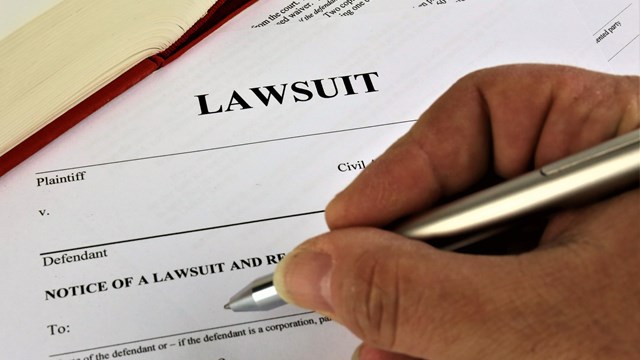
Lawsuits are an unfortunate, expensive fact of life these days—chances are if you live long enough, you'll be involved in one to at least some degree. In the context of an HOA, a legal issue can arise between a resident and the board, between two or more residents, or between a group of residents and the board/management, just to name a few of the more common permutations. People can talk about suing or being sued, but what exactly does that mean?
The Process
Receiving a summons and complaint via certified mail or the deputy sheriff can be a terrifying moment, especially if it is unexpected. Although individual board members are not usually held personally responsible for answering lawsuits brought against the association, being served a summons can cause great consternation for any HOA. It means that a process has been set in motion, and it requires action, says Fran McGovern, of McGovern Legal Services, LLC in New Brunswick. "Doing nothing is the worst possible thing that could happen," she says, "because if service has been made and no action has been taken by the defense, the plaintiff can enter default judgment."
The process of going through a lawsuit has a few phases that should be expected, if the case actually gets to trial. According to attorney Stu Weliever of Indianapolis-based law firm Henthorn Harris & Weliever PC, once service is made, an extension will often be filed while an answer is composed. The answer is then filed along with any counter claims. Next, the discovery phase ensues. After the discovery phase is complete, the parties are usually asked to submit to mediation, which may then lead to a trial, if the mediation/arbitration doesn't solve the problem at hand. Litigation can take the form of a "bench" trial before a judge, or a jury trial.
"Discovery is the process by which each side explores in great detail the allegations made in the complaint, as well as the defenses asserted by the defendant," says Thomas Giaimo, an attorney based in Rumson who specializes in condominium and homeowner association law throughout New Jersey. "Discovery includes answering written questions under oath, (referred to as interrogatories); the production and review of documents served pursuant to a formal demand (a subpoena); as well as sworn testimony under oath (depositions)."
"There is always conflicting testimony," says McGovern. The merit of the case—the truth of the facts—is ultimately decided by the jury, or by the judge in a bench trial.
Resident vs. Resident
Conflicts often arise between individuals in a housing community. In high rise buildings, for example, noise transmission can create problems, says McGovern. "Often floor covering regulations stipulate that 80% of the floor should be covered by carpet. The downstairs neighbor may need to sue if the noise regulations are not being followed and the conflict cannot be resolved. The association's general attorney typically does not get involved in an individual's lawsuit. It would create a conflict of interest."
Whole new permutations arise, however, in some cases, continues McGovern. "If the case is unit owner versus unit owner, the association will not get involved, but often the failure to enforce the governing documents will make the association subject to a related lawsuit."
Resident vs. HOA
There are a couple of things that should be avoided when faced with a lawsuit, says Giaimo. If the defendant is an HOA or board, "No statements should be made to the attorney representing the claimant and/or the claimant's insurance carrier without assistance from the association's counsel." He also strongly advises against an HOA attempting to represent itself in legal proceedings.
"Upon notice that the association and/or its governing board has been named as a defendant in a lawsuit, the association should contact its attorney," continues Giaimo."In most instances, claims filed against the association are covered by one insurance policy or another… All policies of insurance require their insured—in this case, the association—to immediately inform the insurance carrier that a claim has been filed.It is critical that this notice be provided to the insurance carrier as soon as is practical so as not to provide the carrier with an opportunity to deny defending the claim based on timeliness."
"Another thing that the association should do is go out and investigate the charges," adds McGovern. "For example, in a trip-and-fall case, they should go out and investigate the source of injury. If it was a vertically displaced concrete slab and someone tripped over it, the association should determine whether there is a dangerous condition out there, and if there is, the association, in consultation with the attorney, should take steps to remedy it. That way you don't have another claim on the back of the first."
"Initially, legal counsel's role is to ascertain the validity of the claim and to provide guidance to the governing board as to the most appropriate response to be fashioned by the association," says Giaimo. "Those responses can range from settling the claim, filing an answer to the complaint and/or filing a counterclaim against the claimant, and/or impleading another responsible party into the action."
HOA vs. Resident
"From time to time an association's governing board will direct legal counsel to initiate a civil action claim against a unit owner," says Giaimo. "This typically happens when the unit owner is non-compliant with his or her obligations as dictated by the community's governing documents, such as the master deed, bylaws and rules and regulations.Noncompliance is typically found in areas involving a failure to remit fees and assessments levied by the association, or failure to abide by the community's rules or seek association approval for a modification to a limited common element such as a deck or patio."
ADR's Role
According to McGovern, "If alternative dispute resolution (ADR) has not been offered, courts will, at their discretion, dismiss the case and send it back to ADR to try to amicably work out the dispute before the case can be taken to court. Since people live together in the community association realm, there is a strong policy of working things out amicably, because they are neighbors. Also, with the growth of HOAs in New Jersey, the less serious issues began to clog the courts, so [ADR] provides a process by which these cases can be disposed of without coming to court."
There are a few stipulations with ADR, however. "In New Jersey, the right to invoke ADR lies with the unit/homeowner—not with the association," says Giaimo. "In addition, ADR is only required in housing-related disputes in New Jersey. If for example, an association's complaint against a unit owner is for an alleged failure to pay fees and assessments, the association does not need to offer the involved unit owner ADR. It should also be noted that if ADR is invoked and results in a resolution unsatisfactory to the unit owner, the unit owner is not prevented from seeking a judicial remedy in court."
"Another form of ADR is formal arbitration," continues McGovern, "where someone is appointed to try to resolve the conflict. An arbitrator tries to determine what the outcome of the trial would be, while mediation is more of a sit-down between the parties to try to get them to resolve the dispute on their own. The case can still go to trial after these processes."
Costs
Lawsuits are notoriously expensive. Involvement in one can seriously deplete financial resources long before a judgment is made. "If their defense is covered by insurance, it may not cost the association anything," says McGovern. "However [a lawsuit coverage claim] will impact the association's insurance fees in the future."
On the other hand, "A simple matter of rule violation can run from $3,000 to over $10,000 for either the HOA or the resident not covered by insurance," says McGovern. "More complicated cases can go up to hundreds of thousands of dollars. In the more complicated cases, people forget that it doesn't involve just attorneys' fees. You may have to pay fees for expert testimony: an engineer, management practices expert, or a forensic accountant, for example."
"Ninety percent of all litigation which is filed does not result in a trial," says Giaimo."The costs and expenses to be incurred by both the plaintiff and defendant quite often portend against presenting issues of fact to a jury and/or judge for determination."
On the Record
"Unfortunately, there is nothing an association can do to preclude an individual from filing multiple lawsuits against it," says Giaimo."In each and every instance, the association must go through the proper protocols for defending the claim. However, individuals who have a history of filing multiple claims against an association are not viewed favorably by the courts."
The habitual lawsuit-filer may face other obstacles—if he or she is trying to get into a new HOA, for example. "Most litigation documents are available at the courthouse," says McGovern. "A co-op board might take note of a person with a long history of litigation. Many courts hold documents for six years, and sometimes longer."
In addition, there are a couple of other moves that can discourage frivolous lawsuits. A defendant's attorney can generate a letter saying that if the judgement determines that the claim is frivolous, then they will ask for their attorney fees to be paid by the plaintiff.
"The motion of summary judgment is where the attorney for the defense typically argues to the court that even if the claims of the plaintiff are true, the law does not provide a remedy," says McGovern. "For example, let's say there is cracked concrete in front of the building. If Mr. Jones sues for damages, due to negligence, and if Mr. Jones has never been injured, then there has been no damage, and the court would dismiss the case."
An offer of judgement is where an association can offer to pay an amount deemed appropriate, say, $5,000 for damages, instead of the $5 million cited in the lawsuit. If the offer is denied and the judgement is awarded for $5,000, the attorney fees may be deducted from the award.
In the End
At the end of the day, nobody wants to be on the receiving end of a lawsuit, frivolous or otherwise. For HOA boards and managers, steering clear of legal trouble means keeping lines of communication open between community administrators and residents, and acting promptly to correct problems when they arise. To do otherwise invites suspicion, frustration and resentment—all of which can make people more apt to sue when the "final straw" comes up, whatever it may be.
For residents, the formula for avoiding lawsuits is similar: practice good manners, follow your association's rules, and be a good neighbor. There will always be one or two people in a community that just can't seem to bring themselves to get along with their board and fellow residents, but even so-called troublemakers sometimes have legitimate complaints. By giving due respect and attention to residents' concerns and grievances, a board/management team can go a long way toward creating a more peaceful, harmonious community.
Denton Tarver is a freelance writer and a frequent contributer to The New Jersey Cooperator.






Comments
Leave a Comment